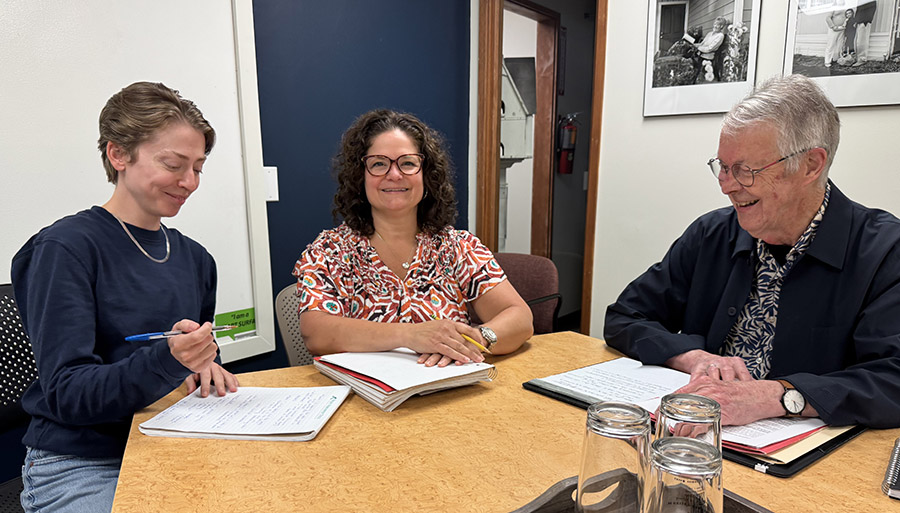Realism and an ethic of collaboration fuel HRB advocacy to prepare the way for affordable housing—and not just its own. (Pictured above HRB’s Maggie Rich and Phedra Elliott with Councilmember Jon Quitslund.)
Our advocacy strategy begins here: HRB can’t meet the need for affordable housing on Bainbridge Island alone. This acknowledgement doesn’t diminish the importance of our contributions as the only nonprofit affordable housing provider and community land trust based on Bainbridge. Rather, it has made us powerful advocates for legislation, development standards, and funding that enable not only HRB, but other nonprofit developers, private developers, and the city to effectively address our housing affordability crisis.
Four years ago, HRB hired Maggie Rich in the newly created public policy director role, a testament to our commitment to advocacy and to the time and strategy required to do it well. Prior to their hire, HRB did not engage significantly with the city, reacting to policy considerations as they arose rather than consistently participating in the conversation, but that has all changed. Since January of this year alone, Rich has watched bimonthly Planning Commission meetings totaling over 50 hours, covering updates to the Comprehensive Plan and Winslow Subarea Plan. It’s a big investment, Rich admits, but it allows them to pay close attention and discover opportunities, in real time, when HRB can provide information and a firsthand, hyperlocal perspective. However, the effort runs two ways. Housing allies on City Council and Planning Commission who feel a duty to represent the issues accurately also reach out to HRB for deeper understanding. The result is frank and functional relationships that move the work forward.
HRB participates in the Northwest Community Land Trust Coalition, which engages at the state level, but otherwise focuses its advocacy with the city where it can have the greatest effect. The state can pass sweeping requirements, but the reality, as Rich explains, “is that local government has the biggest say over how much can be built, where it can be built, who can build it, who gets the incentives, and if it is going to prioritize affordability… It’s still up to us to ensure that it’s actually happening and that it can actually result in housing.”
This reciprocity between state mandates and city action could not be more graphic than with House Bill 1220. This 2019 legislation, which strengthened the housing element of the Growth Management Act, requires that cities and towns plan for growth, specifically housing that is affordable to households at designated income bands. The state may have passed the legislation, but it is up to cities and towns to decide where to place that housing and which combination of development regulations will make it feasible.
Activating supporters has been an essential element in our advocacy strategy. HRB sends out advocacy alerts which explain the issues, provide updates, and let supporters know when a letter or meeting attendance will have the most impact. HRB has also been instrumental in organizing community stakeholders with a professional interest in housing policy.
“Bainbridge is a small enough place that we are familiar with the people who are really invested and want to make a difference and want to be a part of the conversation—planner-architects and developers with whom we have conversations often about how to ensure we can build more affordable housing on Bainbridge Island, specifically in the context of the Winslow subarea plan and comp plan update,” said Rich. Earlier this year, they saw an opportunity for some “good organizing” and a way to avoid a situation in which we are talking “through and past one another.” With the support of two sympathetic Council members, Rich created the Winslow Working Group which meets regularly to explore how the development in the Winslow Subarea, in particular, might be maximized to meet our affordable housing needs and how a variety of players might be engaged in this work.
Over the last few years, HRB has seen results from its investment in advocacy work, including a reduction in development fees for affordable housing, revisions to the Housing Design Demonstration Projects ordinance that balance sustainability with the constraints of building affordably, and a density bonus for affordable housing to be developed by HRB on land donated by Bethany Lutheran Church. But there has been a less measurable and equally powerful outcome too. The way that affordable housing is talked about has fundamentally changed. There is greater awareness about its true costs and what it takes to get it built in terms of development standards and the diversity of contributors beyond HRB. “The work of planning for housing will never be finished,” said HRB Executive Director Phedra Elliots, “but will always need to be tweaked and shifted to respond to market conditions.”
Certainly, HRB has matured in how it partners with the city, but both the city and the community have grown as well. “Housing is not an issue that can be ignored anymore,” said Elliott. “There is probably no greater thing that’s talked about here other than maybe the environment and water. So, we’re not competing for attention with our electeds the way we were even three years ago.” In the end, she said, “There’s no magic solution. It’s got to be everything and everyone.”
